The great appliance debate
Fixing household appliances can be a pain, but while throwing in the towel and buying new ones is definitely the easier route, many would rather put a little elbow grease into repairing them. We surveyed 1,025 Americans to see who's giving up, and who's buying into the idea of maintaining household items.
Which ones do they think they could save the most money on by repairing instead of splurging on a replacement, and if people do look into a new purchase, where do they begin their search? We also surveyed couples to see what their dynamic is like when tackling repairs and explored the tenant/landlord relationship in regards to maintaining appliances. Read on to learn more about the repair/replace debate!
The logical choice
Seventy-five percent of respondents preferred not to admit defeat when one of their household items stopped working and instead opted to try and fix it themselves to save some money.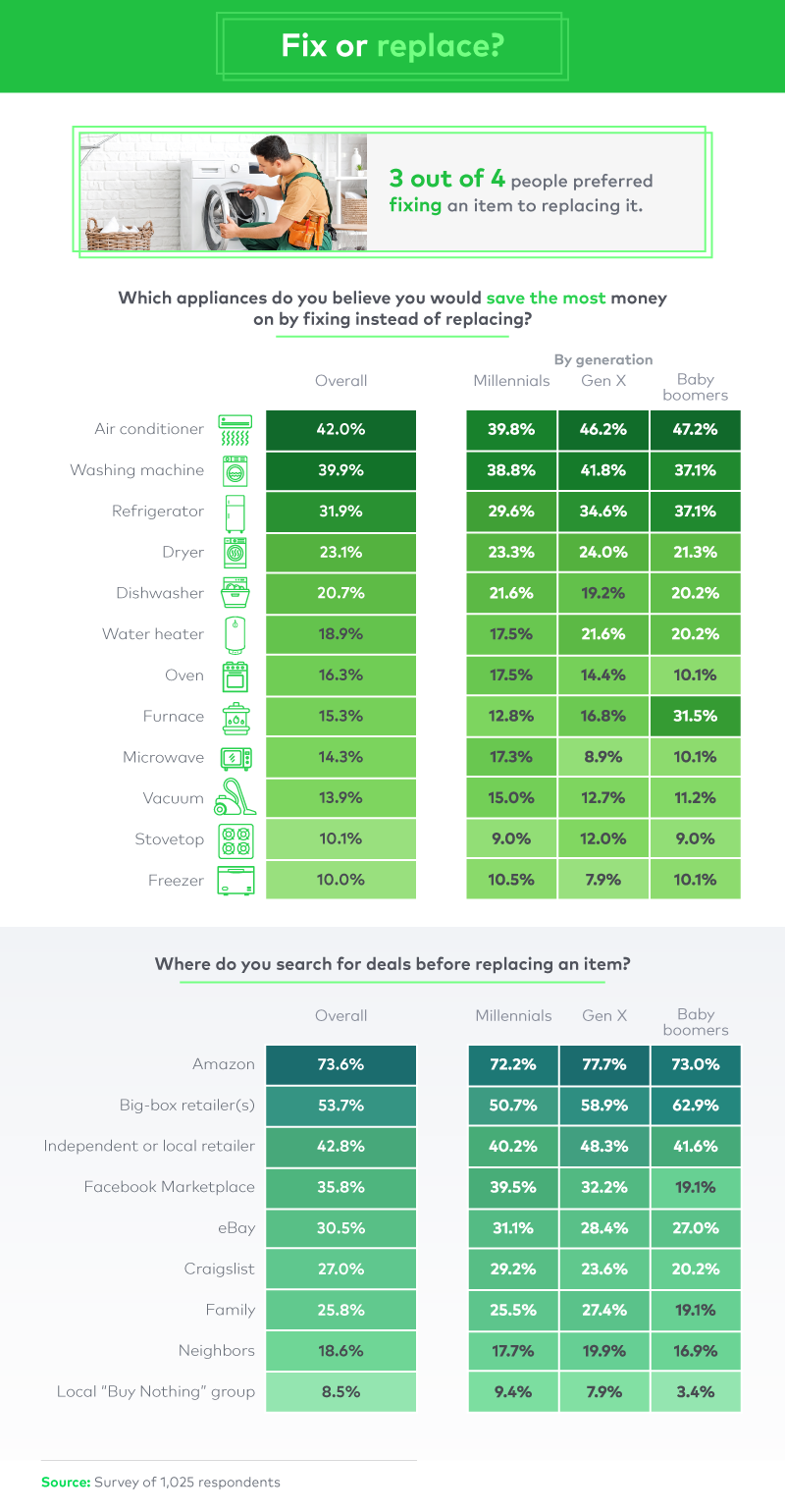
Respondents believed that air conditioners, in particular, were the appliance most worthy of a repair attempt – and you can find a full, detailed breakdown of how to fix yours here. Other items that would save respondents lots of money with a fix were deemed to be washing machines and refrigerators. Some tips to keep your refrigerator in tip-top shape include not overfilling it, wiping the doors and seals once in a while, keeping the temperature between 35 and 40 degrees Fahrenheit and making sure the vents remain unblocked. Baby boomers were more likely than any other generational group to fix their air conditioners and fridges instead of buying a new one, while the same could be said about Gen Xers in regards to washing machines.
The most common place to look for deals before buying a new item, among all generations, was Amazon. If they didn't find what they were looking for there, the next best option was seeing what big-box retailers had to offer, followed by independent, local retailers.
No expert, no problem
When tackling a household repair, most respondents were somewhat or very confident that they'd be able to get the job done on their own.
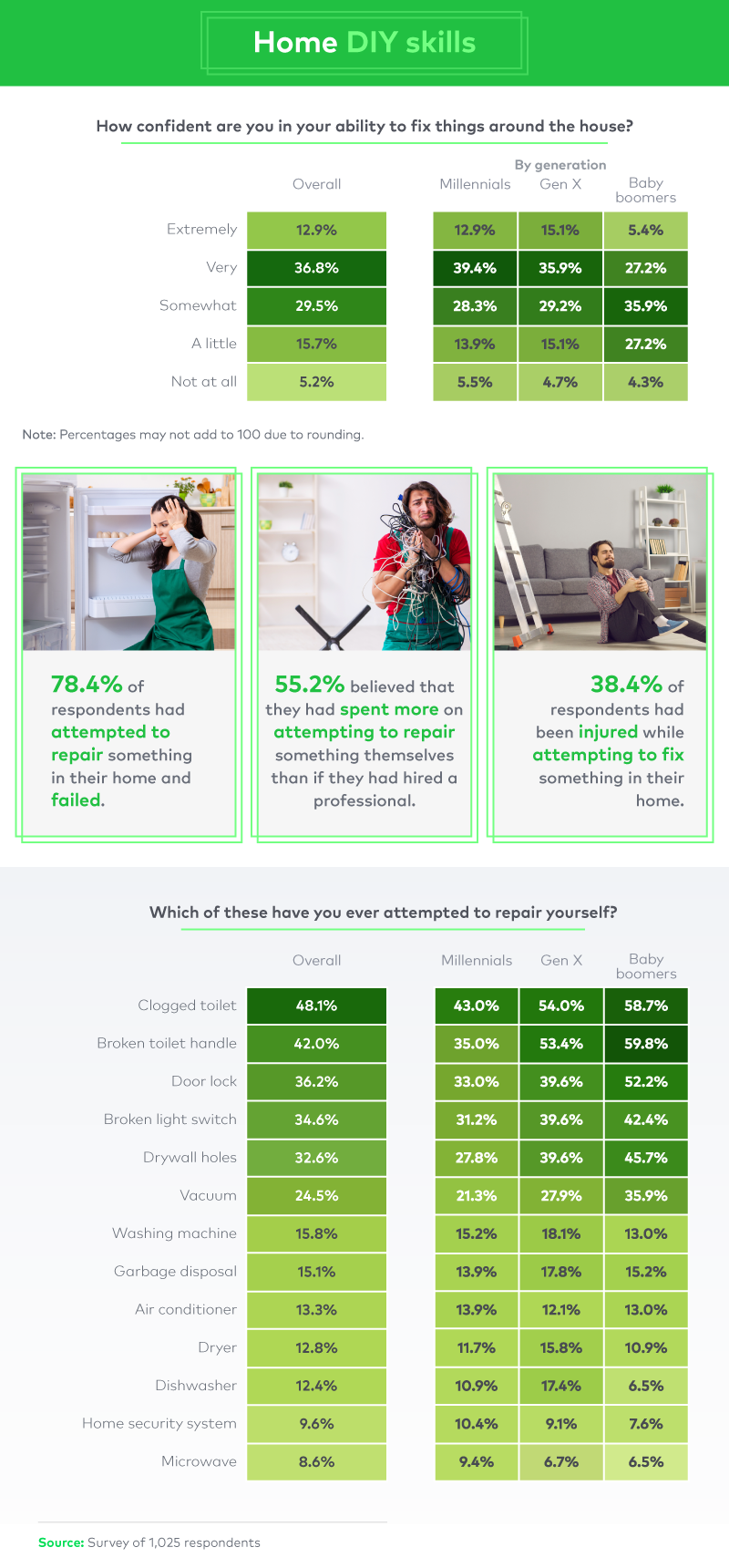
Generally, millennials and Gen Xers believed in themselves more than baby boomers did. Also, nearly 56% of men were confident in their ability to fix things around the house, compared to 42% of women. Either way, over 78% of all respondents admitted to failing a repair task at some point, more than 55% thought hiring a professional would've been cheaper in the long run and 38.4% had injured themselves trying to fix something.
The repair task that had been attempted by the most respondents was unclogging a blocked toilet, perhaps because it is one of the easiest. In fact, you can even unclog a toilet without using a plunger – alternatives include pouring hot water into the bowl and experimenting with baking soda and vinegar, liquid dish soap and bath bombs. Interestingly, even though baby boomers were the least confident in their ability to tackle appliance issues, they were more likely to say they had attempted the six most common repair jobs than either of the younger generations.
Respondents also used different resources to learn how to fix things properly. The most common references were YouTube, Google, friends and family, DIY influencers and books. Social media was a popular choice too – almost 1 in 10 millennials had used TikTok to learn how to fix something. That being said, people were the most likely to fail at a home repair after consulting TikTok (90.6%), Facebook (84.9%) and Instagram (83.8%). Those most successful in their DIY repairs, on the other hand, consulted YouTube (25.1%), Google (23.4%), or simply asked friends and family (20.6%) for their tips and knowledge.
No repairing these relationships
Next, we asked people in relationships which of them took care of the repairs that needed to be done at home. Men were much more likely to say that they were the ones who tackled DIY problems, while more women either said their partner handled the tasks or that it was a joint effort.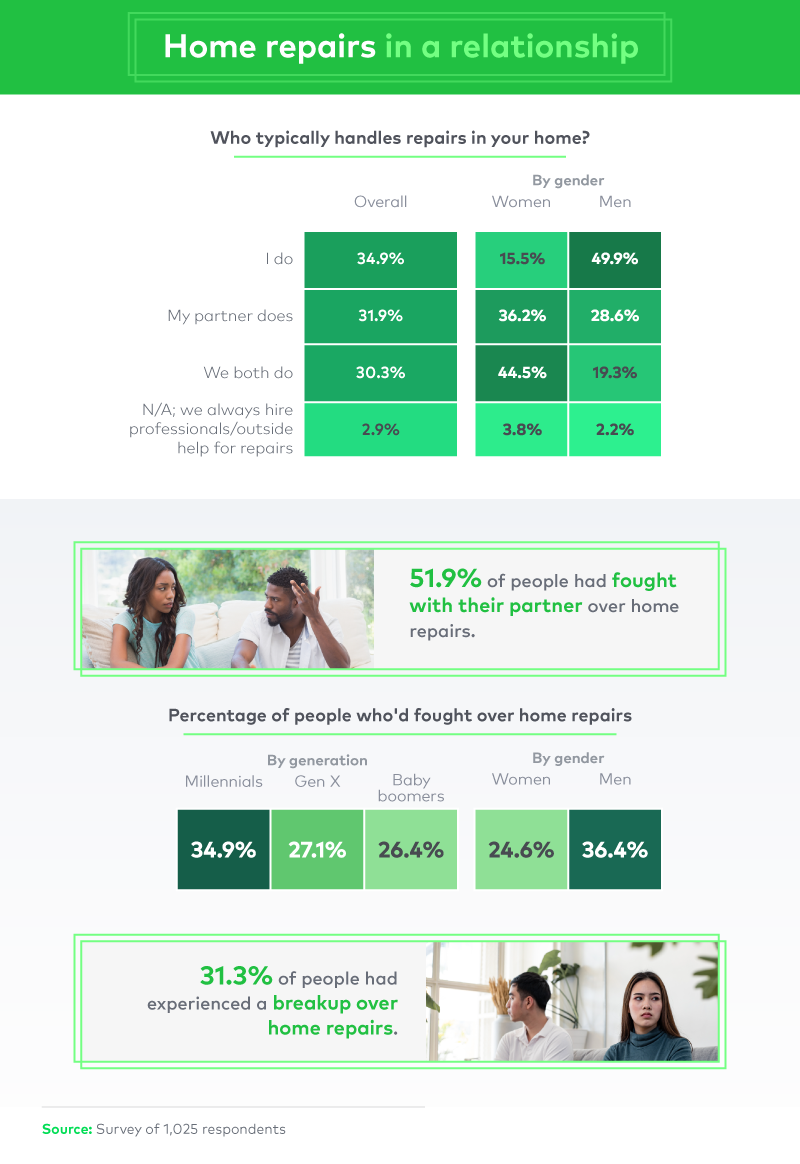
Only a few couples opted to hire outside help – but maybe more should follow suit, considering that over half of our respondents said they've fought with their significant other over home repair needs. In fact, just under a third of respondents said they had broken up over a repair dispute, with millennials and men most likely to report as much. Bringing in a professional would likely eliminate tension between couples when it comes to DIY tasks. It's also more convenient, safe and can save both time and money. Win-win, right?
Renter/landlord dynamic
Next, we quizzed renters to find out more about their interactions with their landlords when it came to home repairs.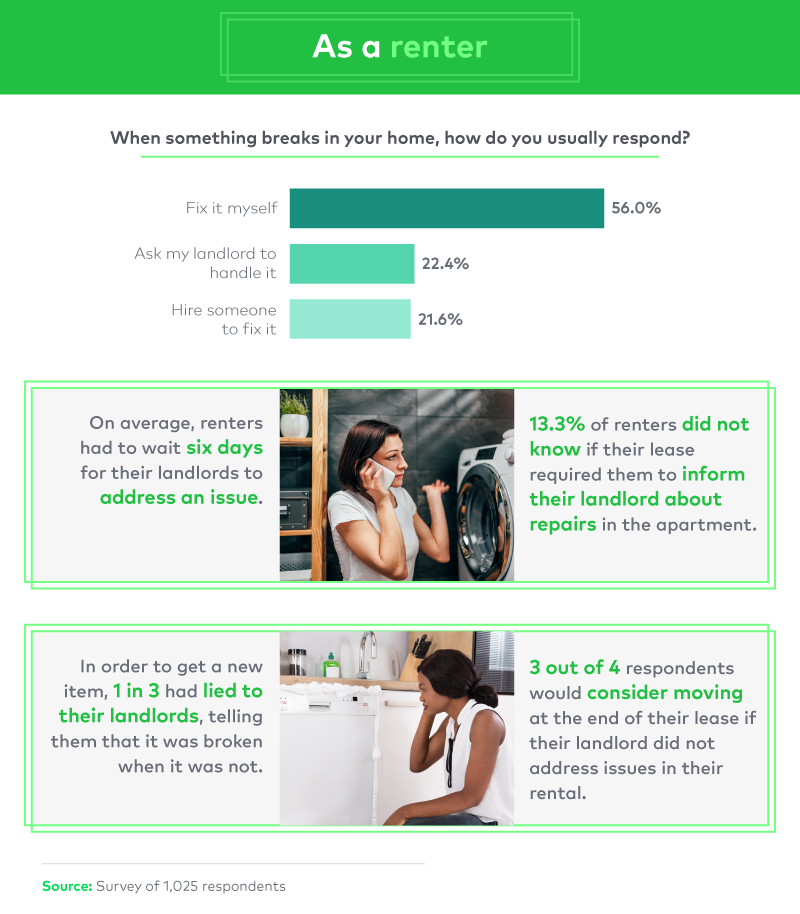
When something broke in their home, 22.4% of renters reached out to their landlord to fix it, but waited six days, on average, for the issue to be addressed. Also, over 13% didn't know if they were required to inform their landlord about repairs in their apartment. For a generational breakdown of this statistic, 31.6% of baby boomers did not know if their lease required them to inform their landlord of issues in their home, compared to 8.4% of Gen Xers and 13.1% of millennials. This may explain why 56% of people decided to go ahead and fix their appliances themselves.
If a repair was left unaddressed by a landlord, 75% of respondents would consider moving out when their lease expired. Meanwhile, 1 out of 3 people had lied about an item being broken just to get a new one. Also, millennials were twice as likely as baby boomers to lie to their landlords about having repaired something when they were in fact putting it off. Respondents should be familiar with what is and isn't the responsibility of landlords – for example, things like dead batteries (in a smoke detector, etc.), burned out lightbulbs and leaky faucets are almost always up to the tenant to handle.
It's a matter of value
Lastly, we asked homeowners to tell us which appliances they would replace or repair before selling their home.
Before selling their homes, nearly 60% of home owners said they would make an effort to repair or replace the air conditioner if need be, with baby boomers being the most likely to do so. The dishwasher and water heater were also top items that people would prioritize fixing or replacing when leaving their homes for good. Again, boomers were most keen on impressing the new tenants. In fact, that was the case for 10 out of the 13 items in question.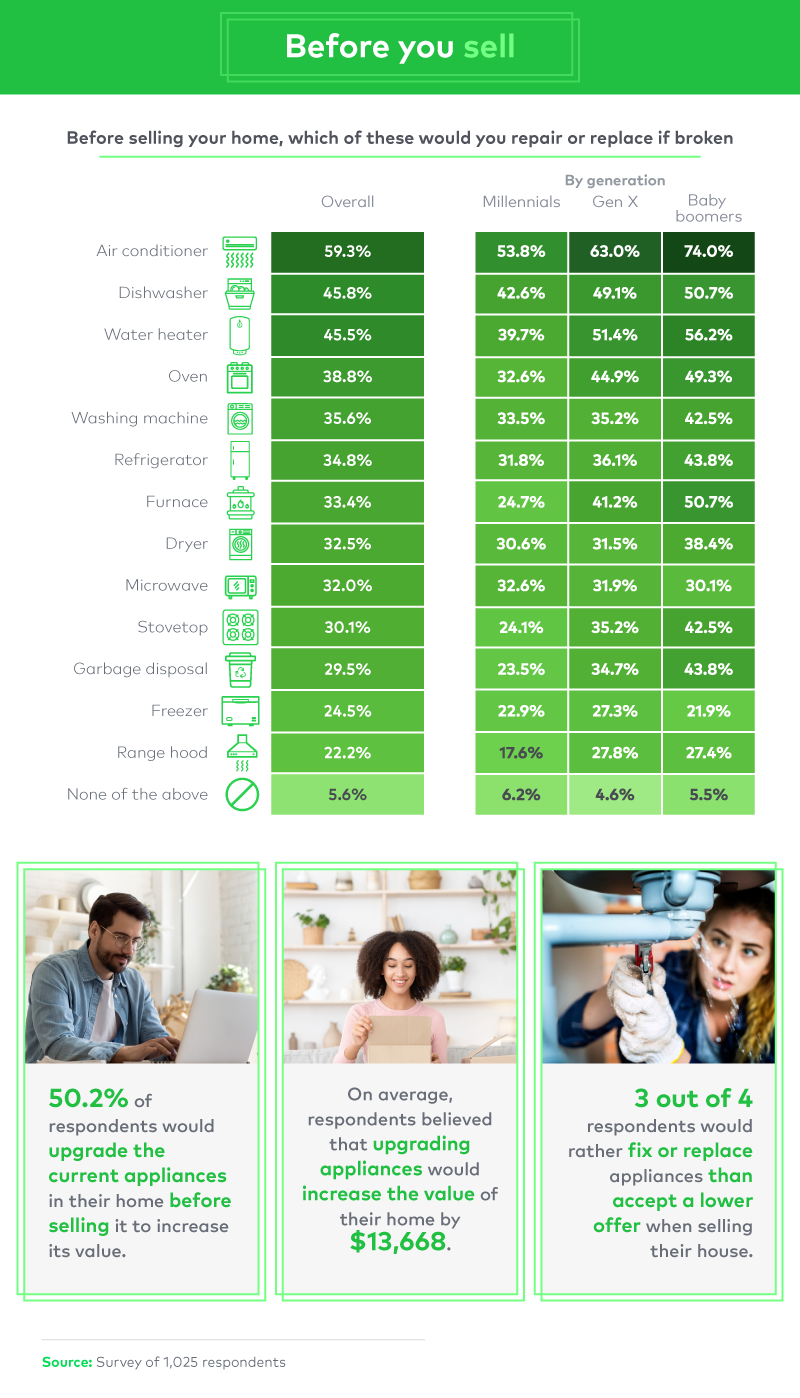
People weren't just making sure appliances were in order as a nice gesture for whoever's moving in next – over 50% of respondents believed these upgrades would increase the sale value of their home by an average of $13,668. In fact, 3 out of 4 people would rather splurge on repairs or upgrades than accept a lower purchase offer. To really boost the return on investment on your potential replacements, consider investing in high-end fridges, built-in stoves and high-efficiency washers when putting your home up on the market.
Getting to grips with household upkeep
The majority of respondents would rather repair appliances than replace them, with air conditioners being the item people believed they could save the most money on. If they were planning on buying a new item, though, Amazon was the first place people would check out.
People were generally confident in their ability to fix things around their house, with unclogging the toilet being the task respondents had attempted most often. Also, over half of people who had landlords still opted to try and repair things themselves – some weren't sure if they were required to report a problem to their landlord, while others simply didn't feel like waiting for a response from them. Meanwhile, homeowners were most adamant on replacing air conditioners before selling their property, likely in an attempt to maximize its value.
Unfortunately, cohabiting couples often ran into issues when dealing with household repairs, with some even breaking up over them. With Cinch Home Services' Home Protection Plan, though, you can save your relationship while keeping your appliances and built-in systems as good as new. Head over now to capitalize on an affordable and reliable home warranty program that will give you the peace of mind you deserve.
Methodology and limitations
This study uses data from a survey of 1,025 people located in the U.S. Respondents were gathered through the Amazon Mechanical Turk survey platform where they were presented with a series of questions, including attention-check and disqualification questions. 56.7% of respondents identified as men, while 43.3% identified as women. Respondents ranged in age from 18 to 79 with an average age of 47. Millennials accounted for 53.2% of respondents, 29.1% were Gen Xers, 15% were baby boomers and 2.7% were Gen Zers. Participants incorrectly answering any attention-check question had their answers disqualified. This study has a 3% margin of error on a 95% confidence interval.
Please note that survey responses are self-reported and are subject to issues such as exaggeration, recency bias and telescoping.
Fair use statement
If you know someone who's unsure whether to keep trying to fix a pesky household appliance or to throw in the towel and purchase a new one, feel free to send them this article. We just ask that you do so for noncommercial use only and to provide a link back to the original page so contributors can earn credit for their work.